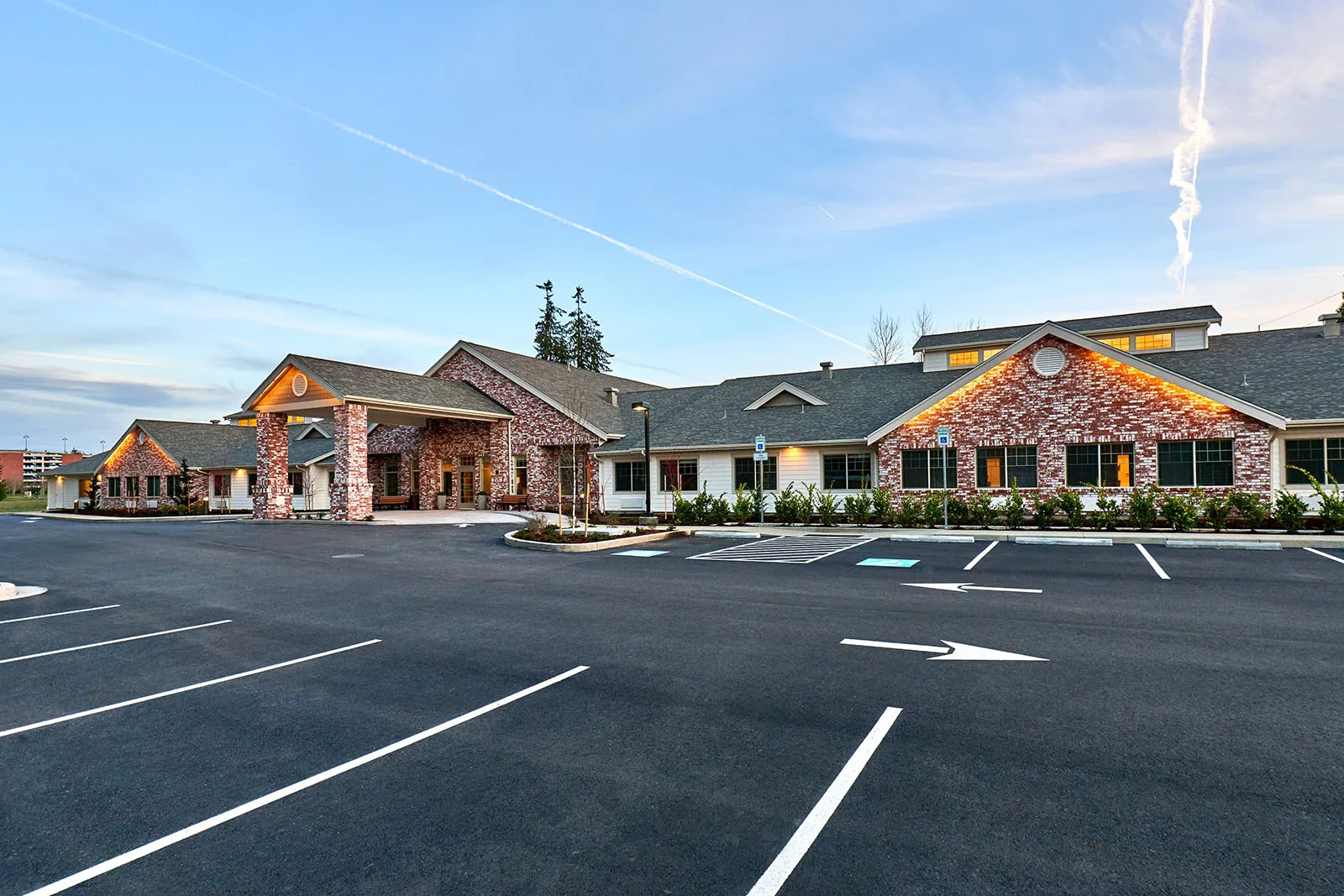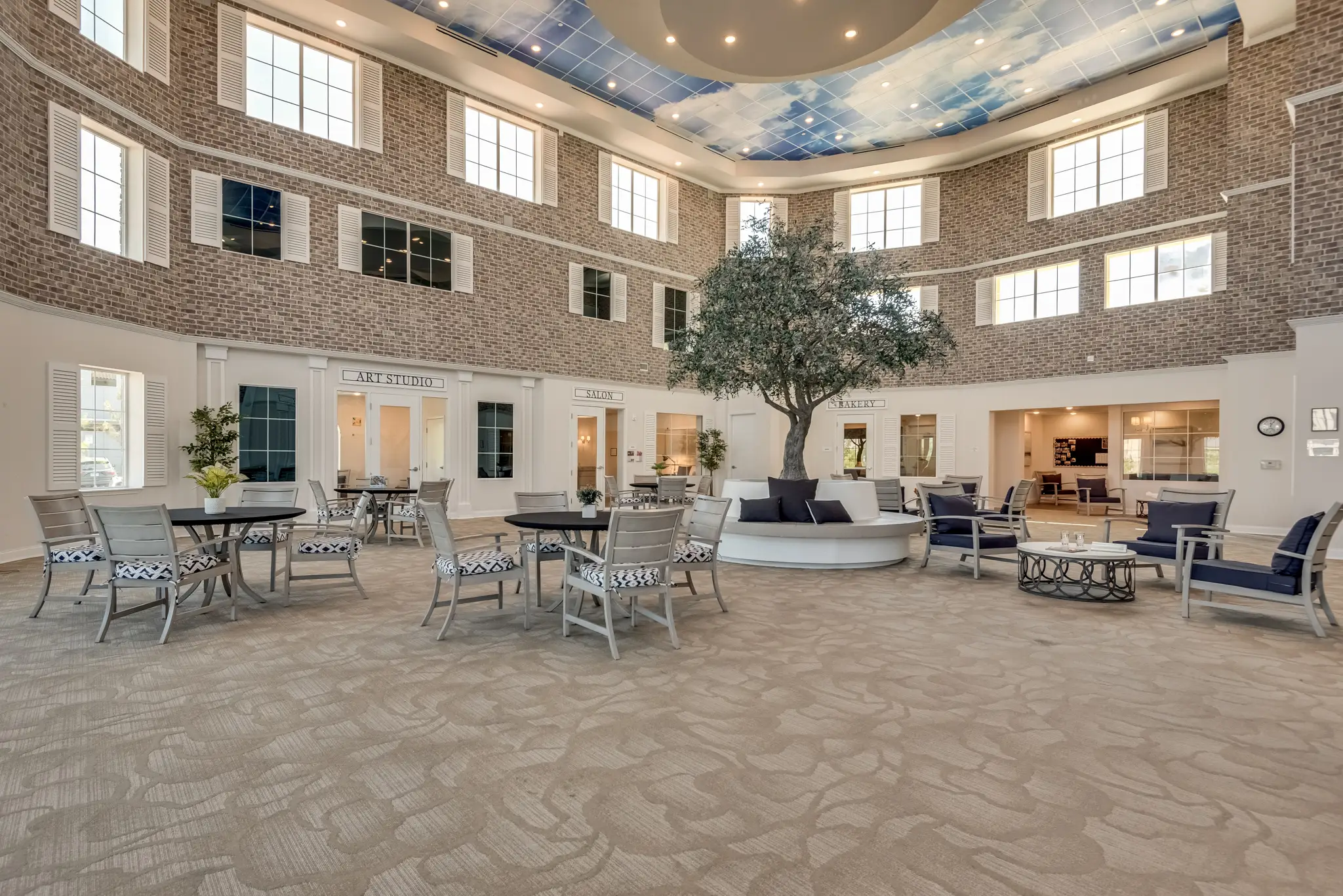10 Questions to Ask Before Choosing a Memory Care Community

Understanding the Decision
Choosing a memory care community for a loved one living with Alzheimer’s disease or another form of dementia is one of the most important decisions a family can make. It’s not only about finding a safe environment but also about ensuring your loved one receives the specialized care, dignity, and enrichment they deserve.
To help guide families through this journey, we’ve put together a list of 10 essential questions to ask before choosing a memory care community. These questions will give you clarity, confidence, and peace of mind in making the right choice.
And at the end, don’t miss our Bonus Section: How to Tell Which Memory Care Communities Truly Stand Out, where we share insider tips for looking beyond the marketing to see what life in a community is really like.
1. What Kind of Specialized Dementia Training Do Staff Receive?
Memory care requires more than general caregiving. Staff should receive ongoing, dementia-specific training that goes well beyond the basics taught during orientation. Ask how often staff receive refresher courses and whether training is hands-on, scenario-based, or taught by dementia care experts.
Key areas of training to look for include:
- De-escalation techniques for managing challenging behaviors like aggression, agitation, or sundowning.
- Communication strategies that use patience, redirection, and validation rather than confrontation.
- Person-centered care that emphasizes each resident’s life story, preferences, and routines.
- Compassionate assistance with personal care tasks while preserving dignity.
- Family involvement training so staff know how to partner with families and provide regular updates.
👉 Tip: Ask if the community has a signature memory care program (like ONELIFE’s Luminate Memory Care) or if they rely on generic training. Communities that prioritize ongoing education tend to provide more consistent, compassionate care. Learn more about Dementia Care Practice Recommendations.
2. How Does the Community Ensure Safety?
Safety is a top concern for families, especially when dementia symptoms like wandering or confusion increase risk. But the best communities balance safety with dignity — ensuring residents can move freely and enjoy life without feeling restricted.
When touring, ask about:
- Secured Entrances & Exits: Are doors monitored, coded, or alarmed to prevent unsafe wandering?
- Monitored Outdoor Spaces: Look for enclosed courtyards or walking paths where residents can safely enjoy fresh air and sunshine.
- Emergency Protocols: What happens if a resident falls or experiences a medical emergency? Are staff trained in first aid and CPR?
- 24/7 Supervision: Is staff always present and visible, not just during business hours?
- Technology: Some communities use motion sensors, wearable alerts, or monitoring systems to enhance safety without being intrusive.
👉 Tip: During your visit, notice if residents appear both safe and relaxed. Overly restrictive environments can cause anxiety, while well-designed safety measures allow residents to feel secure and independent.
3. What Is the Staffing Ratio?
The number of caregivers per resident makes a huge difference in daily life. Most states set minimum staffing requirements, but these vary widely and are often designed for basic safety only, not personalized attention. For example, some states allow ratios as high as 1 caregiver for 10–15 residents during the day, and even fewer staff at night.
Many communities meet these minimums but do not exceed them — which can leave staff stretched thin during busy times like mealtimes, evening routines, or emergencies.
When asking about staffing, look for:
- Daytime Ratios: Ideally, 1 caregiver for every 5–8 residents.
- Nighttime Ratios: At night, 1 caregiver for every 10–12 residents is a reasonable benchmark.
- Staff Longevity: Ask how long caregivers typically stay. Consistent, long-term staff build stronger trust and better relationships with residents.
- Flexibility: Does the community adjust staffing when residents’ needs increase? Quality providers should have plans for extra support when necessary.
👉 Tip: Don’t just ask about numbers. Ask how staff are deployed during meals, activities, and transitions — the busiest times of day when extra help is most important.
4. What Kind of Daily Routines and Activities Are Offered?
Meaningful engagement is critical in memory care. A strong community goes beyond simply offering activities — they create structured, purposeful routines that help residents feel safe, stimulated, and valued.
Here’s what to ask and look for:
- Variety and Balance: Activities should include physical wellness (walking groups, chair yoga), cognitive stimulation (puzzles, memory games, music therapy), social interaction (group discussions, themed events), and creative outlets (art, gardening, crafts).
- Personalization: Are activities adapted to match different stages of dementia? Residents in early stages may enjoy more complex activities, while later-stage residents need simplified, sensory-based engagement.
- Consistency: Routines matter. Ask if the community follows a daily rhythm (like morning exercise, mid-day engagement, afternoon relaxation). Predictable schedules help reduce anxiety for residents with dementia.
- Resident Choice: Do residents have freedom to choose what they participate in? A quality program balances structure with flexibility.
- Small Group or 1:1 Options: Engagement shouldn’t stop if a resident struggles in groups. Ask if they offer personalized activities for individuals who may need more focused support.
- Outings and Live Entertainment: The best programs bring the world to residents — and residents to the world. At ONELIFE, we offer 1–5 days per week of live entertainment (musicians, performers, interactive programs) and weekly outings to places like museums, movies, parks, and sporting events. Ask if the community provides similar enrichment opportunities that go beyond the walls of the building.
👉 Tip: When touring, look for genuine participation. Do residents seem engaged and happy, or are most sitting idle? The energy of a community speaks louder than any activity calendar.
5. How Are Medical and Personal Care Needs Managed?
Dementia care goes far beyond activities and safety — families need to know their loved one’s daily health and personal needs will be met with skill and compassion.
When asking this question, focus on three areas:
Daily Personal Care
- Assistance with Activities of Daily Living (ADLs): bathing, dressing, grooming, toileting, mobility, and eating.
- Dignity in Care: Do staff treat residents with respect, patience, and privacy when helping with sensitive tasks?
- Flexibility: Are care routines adapted to each resident’s preferences and comfort level?
Medical Support
- Medication Management: Ask how medications are stored, who administers them, and what checks are in place to prevent errors.
- On-Site Clinical Oversight: Is there a nurse on-site daily? Are caregivers trained to spot changes in health or behavior?
- Meet the Nurse: When touring, ask if you can meet with the nurse directly. Their willingness to answer questions about care practices, health monitoring, and communication with families is a strong sign of transparency and quality.
- Partnership with Healthcare Providers: Does the community coordinate with outside doctors, therapists, or specialists if your loved one requires additional care?
Adaptability Over Time
- Care Plan Reviews: How often are individual care plans updated — quarterly, annually, or as needs change?
- Increased Support: Can the community handle advancing dementia symptoms, or will your loved one need to move to another setting?
👉 Tip: Ask about a real-life scenario — for example, “What happens if my loved one refuses medication, or if they fall in their room?” The way staff answer will reveal how prepared, proactive, and compassionate their approach truly is.
6. How Is Dining Handled for Residents With Dementia?
Mealtimes are often one of the most important — and most challenging — parts of the day for individuals living with dementia. Families should look for communities that make dining safe, enjoyable, and dignified.
When asking this question, focus on the following:
Dining Experience
- Structured Mealtimes: Consistent schedules help reduce anxiety and confusion.
- Environment: Smaller, quieter dining rooms often help residents focus on eating rather than being overwhelmed by noise or movement.
- Encouragement, Not Pressure: Staff should guide and support residents, but in ways that respect choice and dignity.
Nutritional Support
- Menu Variety: Balanced meals with choices tailored to resident preferences.
- Dietary Needs: Can the community accommodate medical diets (e.g., diabetic, heart-healthy) or cultural/religious preferences?
- Hydration: Are beverages offered throughout the day, not just at meals, to help prevent dehydration?
Dementia-Friendly Practices
- Adaptive Utensils & Dishware: High-contrast plates, weighted utensils, and easy-to-hold cups help residents stay independent.
- Finger Foods: For later-stage dementia, meals that can be eaten without utensils maintain dignity and independence.
- One-on-One Assistance: Ask if caregivers provide individualized support when needed, especially for residents who struggle with appetite or coordination.
👉 Tip: When touring, ask to share a meal in the dining room. Notice the food’s quality, the atmosphere, and how staff interact with residents. A meal will often tell you more about the community’s care than any brochure.
7. How Are Families Involved in Care Decisions?
The best memory care communities recognize that families are essential partners in care. While staff provide daily support, families bring unique insight into their loved one’s history, preferences, and personality.
When asking this question, focus on:
Communication Practices
- Care Plan Meetings: How often are they held — quarterly, semi-annually, or only when issues arise? Consistent meetings help families stay updated.
- Regular Updates: Do caregivers provide phone calls, emails, or portal messages about daily life and health changes?
- Point of Contact: Is there a dedicated nurse or care manager you can easily reach with questions?
Family Engagement
- Visitation: Are visiting hours flexible, and are families welcome at mealtimes, activities, or outings?
- Family Events: Does the community host caregiver support groups, family nights, or educational sessions?
- Transparency: Are families included in decision-making about medications, activity plans, or care changes?
Partnership Mindset
Look for a community that values collaboration over control — one that invites your input, shares updates proactively, and makes you feel like part of the care team.
👉 Tip: Ask families already in the community how communication works for them. Honest feedback will reveal whether the community truly values family involvement or just says it does.
8. What Is the Community’s Approach to Transitions and Levels of Care?
Alzheimer’s and other dementias progress over time, meaning your loved one’s care needs will change. A good memory care community has a clear plan for adapting care so residents don’t face unnecessary moves or disruptions.
When asking this question, focus on:
Flexible Care Plans
- Regular Assessments: How often are care needs re-evaluated — monthly, quarterly, or only once a year?
- Personalized Adjustments: Can the staff quickly adapt to increased needs (such as more hands-on support, behavioral changes, or mobility challenges)?
Continuity of Care
- Progressive Support: Does the community provide care for all stages of dementia, or will your loved one need to move elsewhere if needs become complex?
- Specialized Programming: Ask if programming adapts for later stages, such as sensory engagement, music therapy, or one-on-one activities.
Transitions Between Services
- Assisted Living to Memory Care: If a community offers both, how is the transition handled? Families should look for smooth moves with consistent staff and familiar surroundings.
- Hospice Partnerships: Ask if the community partners with hospice providers so your loved one can remain in place at the end of life.
👉 Tip: Stability is everything in dementia care. Communities that plan for seamless transitions reduce stress for both residents and families. Look for a provider that can support your loved one through every stage of their journey.
9. What Do Short-Term Stays or Respite Care Look Like?
Respite care is a valuable option for families who aren’t ready to commit to long-term placement but want to experience a community firsthand. It also gives caregivers much-needed relief while ensuring their loved one is safe and supported.
When asking about respite care, consider:
Length of Stay
- Flexibility: Can respite stays range from just a few days to several weeks?
- Extensions: If your loved one adjusts well, is it easy to extend the stay?
Services Included
- Full Access: Respite residents should receive the same level of care as full-time residents, including 24/7 support, meals, and enrichment activities.
- Personalized Care Plans: Even for short stays, staff should create a tailored plan based on your loved one’s needs and preferences.
Benefits for Families
- Trial Experience: Respite care allows families to “test drive” the community and observe daily routines, staff interactions, and resident engagement.
- Caregiver Relief: Provides peace of mind for caregivers who need time to rest, travel, or manage other responsibilities.
👉 Tip: Ask if respite residents can fully join in activities and outings during their stay. At ONELIFE, respite guests are welcomed into the community just like long-term residents — making it an excellent way to see if the community feels like the right fit.
10. What Do Families and Residents Say About the Community?
Brochures and websites are designed to highlight the positives, but the most reliable insight comes directly from current residents and their families. Their experiences reveal what day-to-day life in the community is really like.
When asking this question, consider:
Reviews and Testimonials
- Online Feedback: Read reviews on Google, Facebook, and senior living directories. Look for recurring themes — both positive and negative.
- On-Site Testimonials: Many communities display thank-you notes or letters from families. Take time to read them.
Firsthand Conversations
- Ask to Speak with Families: A confident community will connect you with current family members willing to share their perspective.
- Observe Family Interactions: When visiting, notice how other families engage with staff and residents. Do they seem welcomed and informed?
Resident Experience
- Engagement and Atmosphere: Do residents look comfortable, active, and cared for, or are many sitting alone without support?
- Authenticity: Real joy and connection can’t be staged — watch for laughter, conversation, and warm interactions between residents and staff.
👉 Tip: Don’t be afraid to ask families direct questions, such as: “What do you love about this community?” and “What challenges have you experienced?” Their honest answers will give you a much clearer picture than any brochure.
Bonus: How to Tell Which Memory Care Communities Truly Stand Out
It’s easy for every community to sound the same on paper. The real difference becomes clear when you visit in person and experience the environment firsthand. Here are practical ways to see past the marketing:
- Observe Staff Interactions: Do caregivers greet residents warmly by name? Are they patient and engaged, or rushed and distracted?
- Watch Resident Engagement: Are residents involved in activities, smiling, and interacting — or sitting alone without stimulation?
- Join an Activity: Ask if you can participate in a group program. Experiencing how residents are guided and encouraged will tell you more than any brochure.
- Stay for a Meal: Dining is central to daily life. Share a meal in the dining room to see food quality, presentation, and how staff assist residents who need support.
- Ask to Speak With Resident Families: A community confident in its care will gladly connect you with current family members. Their firsthand perspective can reveal the day-to-day reality behind the marketing.
- Look for Transparency: Communities that openly answer questions, provide clear pricing, and invite family involvement usually have nothing to hide.
- Ask About Staff Turnover: Consistent, long-term caregivers are often a sign of stability and a positive culture.
- Trust Your Instincts: Beyond features and amenities, pay attention to how the community feels. A warm, welcoming environment speaks volumes.
By going beyond the tour and immersing yourself in daily life, you’ll quickly discover which communities genuinely deliver quality care and which may simply be good marketers.
The Reality of Memory Care: Finding Compassion Beyond Perfection
It’s important to remember that memory care is one of the most challenging forms of caregiving. Dementia is unpredictable, and no community will be perfect all the time. There will be good days and hard days — for residents, families, and staff alike.
What matters most is whether a community’s team is authentic, compassionate, and committed to walking alongside families through every stage of the journey. Look for caregivers who show patience, empathy, and consistency, even when challenges arise.
At ONELIFE Senior Living, our philosophy is to “meet them where they are” — honoring each resident’s unique experience with dementia rather than forcing them to fit a rigid schedule or expectation. This approach allows us to provide care that is not only safe and structured, but also deeply respectful and meaningful.
Because in memory care, perfection isn’t the goal — authentic connection and genuine compassion are what truly make the difference.
Final Thoughts
Choosing a memory care community is a deeply personal decision. Asking the right questions will help you see beyond the brochures and find a place where your loved one will feel safe, valued, and supported.
It’s also important to remember that memory care is complex, and no community will be perfect all the time. What truly makes the difference is a team of caregivers who are authentic, compassionate, and dedicated to meeting residents where they are — walking alongside them with patience, empathy, and respect.
At ONELIFE Senior Living, our Luminate Memory Care program is designed around this philosophy. We focus on creating meaningful moments, purposeful routines, and individualized care that honors each resident’s unique journey. And for families not yet ready for full-time placement, our respite care stays offer a safe, short-term option to experience memory care firsthand and gain peace of mind.
Because at the end of the day, memory care is not about perfection — it’s about connection, dignity, and genuine compassion.
Frequently Asked Questions
What makes memory care different from assisted living?
Memory care provides specialized support for individuals with Alzheimer’s or dementia, with enhanced safety, structured routines, and dementia-trained staff. Assisted living is best for seniors who need daily assistance but don’t require specialized dementia care.
How do I know if my loved one needs memory care?
Signs may include wandering, frequent confusion, difficulty managing daily tasks, safety risks, or changes in behavior such as agitation or withdrawal. If these challenges are becoming unmanageable at home, memory care may be the right option. Read more about the stages of dementia.
Is respite care available in memory care communities?
Yes. Respite care provides short-term stays where your loved one receives the same professional, 24/7 support as long-term residents. It’s often used for caregiver relief, recovery after a hospital stay, or as a trial before permanent placement.
How long can a respite stay last?
Stays usually range from a few days to several weeks, depending on your family’s needs and the community’s availability.
What should I look for when visiting a memory care community?
Pay attention to cleanliness, staff interactions, resident engagement, safety features, dining quality, and whether the environment feels warm and welcoming. Ask to sit in on activities or share a meal to experience daily life.
What is a good staff-to-resident ratio in memory care?
Staffing varies by state, but look for communities with 1 caregiver for every 5–8 residents during the day and 1 for every 10–12 at night. Ratios lower than state minimums often indicate more personalized care.
How much does memory care cost?
Costs vary by location, level of care, and amenities, but according to Genworth’s Cost of Care Survey, the national median cost of memory care ranges from $5,000–$7,500 per month. Ask for a detailed breakdown of fees and what’s included.
Can memory care residents go on outings?
Yes, many communities offer supervised outings to parks, museums, movies, or sporting events. At ONELIFE, we provide weekly outings along with 1–5 days per week of live entertainment inside the community. These experiences help residents stay active and connected.
What questions should I ask the nurse during a tour?
Ask how medications are managed, how health changes are monitored, and what happens in emergencies. Meeting the nurse gives you insight into the community’s medical support and transparency.
Red more about activities and things to do with a person who has dementia:
- Activities for People with Dementia
- 101 Things to do with someone with Dementia
- Games for Dementia Patients
Explore ONELIFE Communities Near You
ONELIFE Senior Living is proud to serve families in multiple regions, offering exceptional care and support tailored to each resident’s needs. In Springfield, Oregon, The Esther at Riverbend Assisted Living provides personalized assisted living services, while The Rawlin at Riverbend Memory Care specializes in compassionate Alzheimer’s and dementia care. Families in Salem can find trusted support at Battle Creek Memory Care, and those in Beaverton benefit from the warm, secure environment at Waterhouse Ridge Memory Care.
For families in Nevada, Vineyard Henderson Memory Care offers expert dementia care in the heart of Henderson, while in California, The Reserve at Fountaingrove Memory Care provides high-quality memory support in Santa Rosa, and The Woodlake Senior Living serves Sacramento with a full spectrum of senior living options. In Cottage Grove, Oregon, Middlefield Oaks Senior Living combines independence and care, while in the Midwest, The Laurel at Vernon Hills Memory Care stands as a dedicated resource for families in Vernon Hills, Illinois. Finally, in Phoenix, Arizona, Shadow Mountain Memory Care delivers compassionate, all-inclusive memory care in a safe and engaging setting.
No matter which location you choose, every ONELIFE community is united by the same mission: providing exceptional care, meaningful activities, and a true sense of family for residents and loved ones.
Contact us
learn more about our
community

More Articles & Resources
EXPLORE THE ONELIFE COMMUNITIES




















